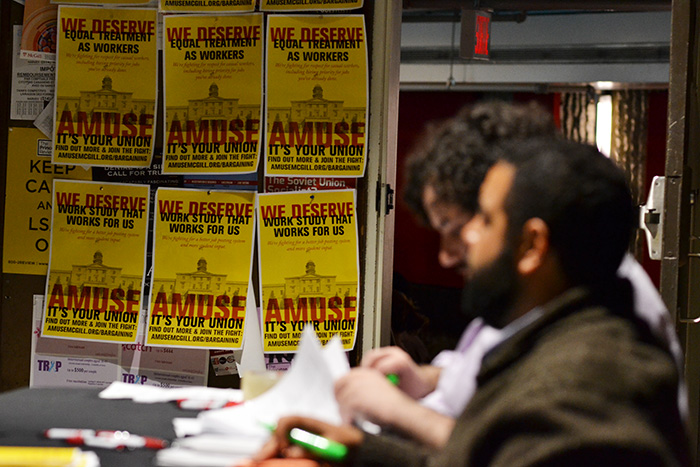With 82 per cent approval, the Association for McGill University Support Employees (AMUSE) pursued a mandate on Oct. 20 to authorize the union to strike.
AMUSE began in Fall 2008 in hopes of unionizing work study employees. According to the AMUSE website, there are currently 1,500 union members, representing both casual and temporary employees at McGill. Approximately 55 per cent of McGill’s non-academic employees are members of AMUSE.
Since May 2015, AMUSE has been at the bargaining table to discuss the renegotiation of its collective agreement with representatives from McGill’s administration. The agreement determines the rate of pay, benefits, and other non-monetary privileges of support employees at McGill.
AMUSE’s monetary demands, which include increasing the number of job titles and reevaluating wages for its members, were all denied by the university. The AMUSE negotiation team hopes that bringing a strike mandate to the table will reverse McGills decision. Communications and Outreach Officer of AMUSE Maxim Baru, who is a member of its negotiating team, explained the union’s strategy.
“Having a strike mandate does not mean that we will be on strike,” Baru said. “It just means that the negotiating team can come back to the employer the next meeting and say, ‘We have the strong strike mandate.’ It will pressure [the administration] into being more willing to negotiate with us.”
Some union members voiced their dissatisfaction with the vote. AMUSE Steward for Phonathon Nikki Derochie was outspoken in her opposition to the vote. Derochie’s job entails acting as the liaison between casual employees at Phonathon and AMUSE.
“We have a group of 70 people [at Phonathon] and I don’t think anybody else is in the room tonight from that group, so I am speaking on behalf of 70 people with my vote,” Derochie said. “I’m really disappointed, just because of the precedent that’s been set in the past. I remember the McGill University Non-Academic Certified Association [MUNACA] strike. A lot of the membership was blindsided by that because within [a week] of the strike mandate vote, MUNACA went on strike, and not a lot of people expected that.”
Despite concerns of under-representation, the AMUSE negotiating team was quick to remind the assembly about the urgent need to take action. Claire Michela, president of AMUSE and member of its negotiations team, stressed the urgency of taking action.
“[The administration] said, ‘We can’t bargain on your terms at all because you have an ongoing complaint with the Pay Equity Commission,’” Michela said. “They don’t want to have an administrative burden of changing things now and then changing things again in a year. Our members can’t wait a year. Our members have contracts of four months, of one month, of one day, so they can’t wait a year to have better pay.”
The administration declined to comment on the ongoing negotiations. According to a report released by McGill describing meetings between AMUSE and the university on Sept. 12 and Sept. 14, McGill pledged to assess the financial impact of AMUSE’s monetary demands and to present this assessment at their following meeting on Oct. 14. AMUSE noted that all of these requests were denied by the University at the Oct. 14 meeting. McGill has yet to release a report on the Oct. 14 meeting.
“They said that they would bargain based on our previous categories, but we think that those categories don’t represent our membership and that they’re unacceptable,” Michela said.
In the original collective agreement between AMUSE and McGill, support employees were separated into three classifications based on the difficulty of their jobs. Employees’ minimum pay rates for the three classes are $10.85/hour, $11.22/hour, and $12.24/hour respectively. The collective agreement categorizes workers into one of three classes based on the number and complexity tasks and the level of autonomy given to the worker.
“We synthesized [the three] job titles that we currently have […] into 33 distinct job titles, and wages that reflect those job titles,” said Michela. “We used the university’s own job evaluation form to do this [….] We adjusted the salaries accordingly. We came up with, all wages would be above fifteen dollars an hour.”
In addition to the monetary demands, AMUSE is demanding a number of non-monetary concessions including creating McGill ID cards for non-student support staff and requiring work study jobs to be clearly posted for the public.
A previous version of this article included inaccurate information regarding the 2011 MUNACA strike. It took place on Sept. 1, one week after the Aug. 24 strike vote—not 24 hours after the strike vote. In addition, a previous version incorrectly stated that the Class A minimum pay rate is $10.55/hour when in fact it is $10.85/hour. Finally, the version incorrectly attributed Maxim Baru's quote to Bradley Powell.








